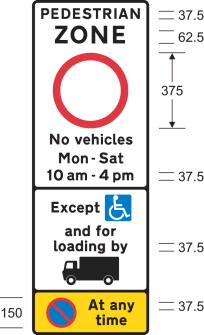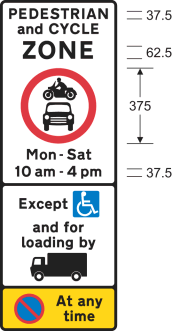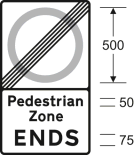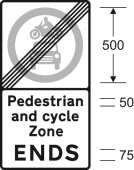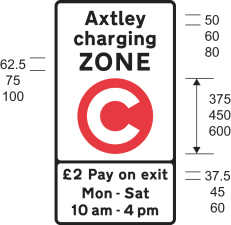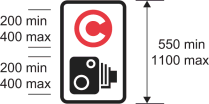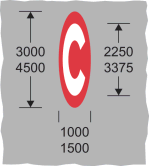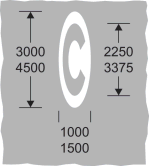Regulation 3, Direction 3
SCHEDULE 8Signs indicating the entrance to and the end of a pedestrian, or pedestrian and cycle, zone, and signs for charging schemes
This schedule has no associated Explanatory Memorandum
PART 1Provisions applying to signs in Part 2
1. The information, requirement, restriction or prohibition of a description in column 2 of an item in the sign table in Part 2 must be conveyed by a sign that is—
(a)of the colour and type; and
(b)complies with the requirements as to size,
shown in the diagram in column 3 of the item, or that diagram as varied in accordance with column 4.
2. Where a sign provided for in the Part 2 sign table is erected on a road subject to a speed limit greater than 20 mph and is within 50 metres of any lamp which forms part of a system of street-lighting, the illumination requirements for the sign are—
(a)where that system of street-lighting is illuminated throughout the hours of darkness, the sign must be illuminated by internal or external lighting for so long as that system is illuminated and may also be reflectorised; or
(b)where that system of street-lighting is not illuminated throughout the hours of darkness—
(i)the sign must be illuminated by internal or external lighting for so long as that system is illuminated and must also be reflectorised; or
(ii)the sign must be illuminated throughout the hours of darkness by means of internal or external lighting and may also be reflectorised.
PART 2Signs indicating pedestrian and pedestrian and cycle zones
Sign table — Schedule 8, Part 2
(1)
Item
| (2)
Sign description
| (3)
Sign diagram
| (4)
Permitted variants
|
|---|
| 1 | Diagram 618.3B
Entry to, and waiting in, a pedestrian zone restricted
| | 1. The time period in the upper panel may be omitted or varied
2. The following symbols and legends may be included in the middle panel to provide for exceptions (including in any combination, provided there is an “and” or “&” before the last exception)—
(a) the legend “buses” or “local buses”
(b) the legend “taxis”
(c) the legend “for access”, “for loading”, or “for loading by” and the goods vehicle symbol
(d) the legend “permit holders”, “permit holder”, and, if appropriate, a permit identifier or identifiers
(e) the disabled badge holder symbol
3. The middle panel may include a time period
4. The time period in the lower panel may be varied
5. The lower panel may be omitted
6. The middle panel may be omitted when the lower panel is omitted
|
| 2 | Diagram 618.3C
Entry to, and waiting in, a pedestrian and cycle zone restricted
| | 1. The time period in the upper panel may be omitted or varied
2. The following symbols and legends may be included in the middle panel to provide for exceptions (including in any combination, provided there is an “and” or”&” before the last exception)—
(a) the legend “buses” or “local buses”
(b) the legend “taxis”
(c) the legend “for access”, “for loading”, or “for loading by” and the goods vehicle symbol
(d) the legend “permit holders”, “permit holder”, and, if appropriate, a permit identifier or identifiers
(e) the disabled badge holder symbol
3. The middle panel may include a time period
4. The time period in the lower panel may be varied
5. The lower panel may be omitted
6. The middle panel may be omitted when the lower panel is omitted
|
| 3 | Diagram 618.4A
End of restrictions associated with a pedestrian zone
| | |
| 4 | Diagram 618.4B
End of restrictions associated with a pedestrian and cycle zone
| | |
PART 3Provisions applying to signs in Part 4
1. The information of a description in column 2 of an item in the sign table in Part 4 must be conveyed by a sign that is—
(a)of the colour and type; and
(b)complies with the requirements as to size,
shown in the diagram in column 3 of the item, or that diagram as varied in accordance with column 4.
PART 4Signs and markings indicating a congestion charging zone
Sign table — Schedule 8, Part 4
(1)
Item
| (2)
Sign description
| (3)
Sign diagram
| (4)
Permitted variants
|
|---|
| 1 | Diagram 677
Entrance to a congestion charging zone
| | 1. The name and logo of the traffic authority in the upper panel may be varied as appropriate or the panel omitted
2. In the middle panel “Central” may be varied to the name of the zone as appropriate
3. In the lower panel—
(a) the time period may be varied; and
(b)(i) the amount of the charge and “Pay on entry” or “Pay on exit” or “per day” or “per vehicle” may be included above the time period; or
(ii) “Pay on entry” or “Pay on exit”, without the amount of the charge, may be included above the time period
|
| 2 | Diagram 678
Entrance to a congestion charging zone (alternative to item 1)
| | 1. In the upper panel “Axtley” may be varied to the name of the zone or to “Congestion” as appropriate
2. In the lower panel—
(a) the amount of the charge may be varied or omitted;
(b) “Pay on exit” may be varied to—
(i)”Pay on entry”; or
(ii) if the amount of the charge is not omitted, “per day” or “per vehicle”;
(c) “£2 Pay on exit” may be omitted; and
(d) the time period may be varied
|
| 3 | Diagram 818.6
Advance indication of a congestion charging zone
| | 1. In the upper panel the time period may be varied
2. In the lower panel—
(a) the distance may be varied;
(b) “ahead” may be placed centrally below the distance;
(c) “ahead” may be omitted and an arrow pointing horizontally to the left or to the right placed centrally below the distance
|
| 4 | Diagram 818.7
Advance indication of a congestion charging zone (alternative to item 3)
| | 1. In the upper panel—
(a) the amount of the charge may be varied;
(b) “day” may be varied to “vehicle”;
(c) the time period may be varied
2. In the lower panel—
(a) the distance may be varied;
(b) “ahead” may be placed centrally below the distance; and
(c) “ahead” may be omitted and an arrow pointing horizontally to the left or to the right placed centrally below the distance
|
| 5 | Diagram 894
Reminder to drivers within a congestion charging zone in which cameras are used to enforce traffic regulations
| | 1. The “C” symbol may be placed to the left of the camera symbol
2. A legend may be added giving the name, and any logo, of the enforcement authority
|
| 6 | Diagram 679
End of congestion charging zone
| | |
| 7 | Diagram 1068
Road marking indicating the commencement of a congestion charging zone
| | |
| 8 | Diagram 1069
Road marking giving advance warning of a congestion charging zone
| | |
PART 5The Schedule 8 General Directions
1. The signs provided for—
(a)in the sign table in Part 2; and
(b)at items 1, 2, 6 and 7 of the sign table in Part 4,
must only be placed to indicate the effect of an Act, order, regulation, bylaw, resolution or notice which restricts or prohibits the use of the road by traffic.
2. An upright sign mentioned in paragraph 1 must be placed as near as practicable to the point the restriction or prohibition begins or ends.
